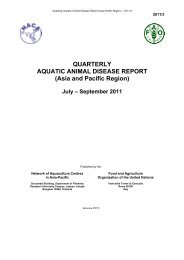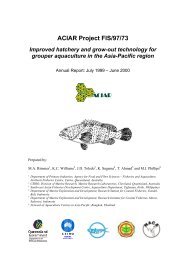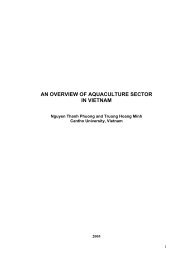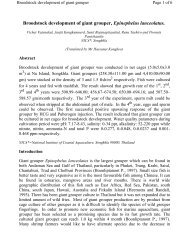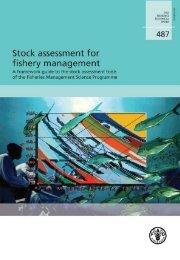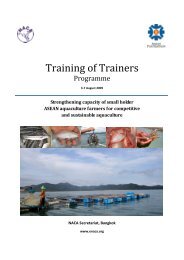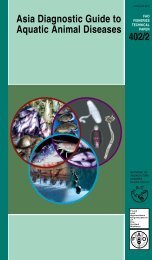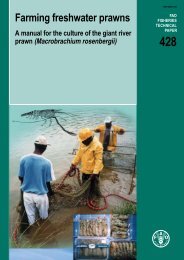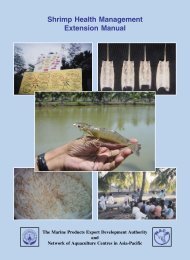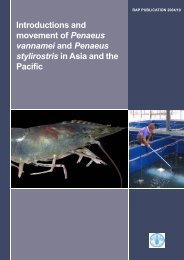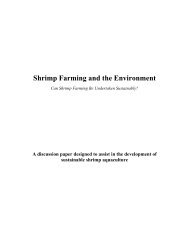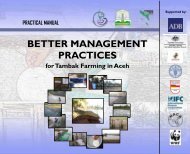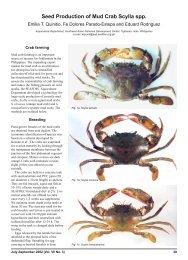State of World Fisheries and Aquaculture 2004 - Library
State of World Fisheries and Aquaculture 2004 - Library
State of World Fisheries and Aquaculture 2004 - Library
Create successful ePaper yourself
Turn your PDF publications into a flip-book with our unique Google optimized e-Paper software.
60<br />
The <strong>State</strong> <strong>of</strong> <strong>World</strong> <strong>Fisheries</strong> <strong>and</strong> <strong>Aquaculture</strong> <strong>2004</strong><br />
• promoting the development <strong>of</strong> national research <strong>and</strong> management capacity;<br />
• improving <strong>and</strong> strengthening data collection, h<strong>and</strong>ling <strong>and</strong> dissemination;<br />
• addressing new issues such as IUU fishing, the management <strong>of</strong> fleet capacity, the<br />
effect <strong>of</strong> the payment <strong>of</strong> subsidies <strong>and</strong> the reduction <strong>of</strong> bycatch <strong>and</strong> discards;<br />
• adopting management measures <strong>and</strong> resolutions relating to such issues as fishing<br />
effort reduction, the use <strong>of</strong> gear, minimum fish sizes, mesh restrictions;<br />
• adopting rules <strong>and</strong> procedures for boarding, inspection <strong>and</strong> enforcement;<br />
• taking measures to enable the implementation <strong>of</strong> recent international instruments.<br />
Regrettably, assessments show that strengthened governance <strong>of</strong> RFBs does not<br />
always translate into more effective fisheries management. One <strong>of</strong> the main constraints<br />
faced by RFBs is a lack <strong>of</strong> willingness on the part <strong>of</strong> member countries to delegate<br />
sufficient decision-making power <strong>and</strong> responsibilities to RFBs, combined, in some cases,<br />
with an inability or reluctance to implement decisions taken by them.<br />
Increased emphasis on decision-making<br />
Article 10 <strong>of</strong> the UN Fish Stocks Agreement includes the obligation for states to<br />
“agree on decision-making procedures which facilitate the adoption <strong>of</strong> conservation<br />
<strong>and</strong> management measures in a timely <strong>and</strong> effective manner”. 23 In this context,<br />
decision-making procedures are not confined to a voting formula but could<br />
involve considerations <strong>of</strong> a variety <strong>of</strong> elements. These might include, for principal<br />
bodies, clear <strong>and</strong> timely procedures for a number <strong>of</strong> actions, the entry into force <strong>of</strong><br />
recommendations <strong>and</strong> decisions within an appropriate time period <strong>and</strong> the inclusion<br />
<strong>of</strong> an objection procedure that is consistent with the criteria <strong>of</strong> timeliness <strong>and</strong><br />
effectiveness; for the subsidiary bodies, they might also include timely procedures for<br />
making recommendations <strong>and</strong> giving advice.<br />
Several RFBs have taken concrete action on a wide range <strong>of</strong> decision-making<br />
objectives, functions <strong>and</strong> processes (the IATTC, for example, see Box 5). Specific areas<br />
include:<br />
• the adoption <strong>of</strong> criteria that determine the nature or extent <strong>of</strong> participatory rights<br />
for new members, that facilitate the adoption <strong>of</strong> conservation <strong>and</strong> management<br />
measures <strong>and</strong> may encourage objectivity;<br />
• the adoption <strong>of</strong> clear decision-making procedures both for the parent body, usually<br />
included in the constitutive instrument, <strong>and</strong> for the subsidiary bodies, generally<br />
detailed in the rules <strong>of</strong> procedure, to ensure that the recommendations or advice<br />
will be timely <strong>and</strong> effective;<br />
• the institution <strong>of</strong> an objection procedure, the length <strong>of</strong> time <strong>and</strong> specific procedure<br />
for which varies among RFBs;<br />
• placing greater emphasis on transparency by adopting, inter alia, procedures for<br />
observers that may specify qualifications, application procedure <strong>and</strong> attendance at<br />
meetings;<br />
• focusing on related areas <strong>of</strong> dispute settlement, particularly the prevention <strong>of</strong><br />
disputes.<br />
However, it is important to note that, in the absence <strong>of</strong> agreed performance<br />
indicators for self-evaluation, which could conceivably include the evaluation<br />
<strong>of</strong> decision-making authority <strong>and</strong> process, it is difficult to establish a correlation<br />
between strengthening governance in terms <strong>of</strong> decision-making <strong>and</strong> effective<br />
fisheries management. This issue is further complicated by the fact that decisionmaking<br />
is only one <strong>of</strong> many interrelated elements <strong>of</strong> governance by RFBs. 24 The three<br />
23<br />
Op. cit., footnote 3, p. 35.<br />
24<br />
Others include institutional arrangements, m<strong>and</strong>ate <strong>and</strong> functions, membership, members’ data provision, budget <strong>and</strong> finance,<br />
capacity, enforcement mechanisms, non-parties undermining measures, cooperative management, partnership/stakeholder<br />
participation, collaboration with other RFBs, political will to implement decisions, acceptance <strong>of</strong> international instruments <strong>and</strong><br />
dispute settlement mechanisms.



